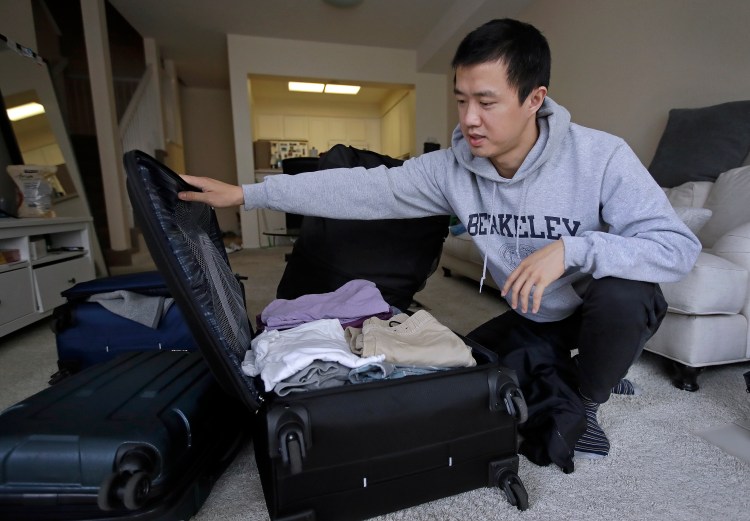NEW YORK — Immigrants with specialized skills are being denied work visas or seeing applications get caught up in lengthy bureaucratic tangles under federal changes that some consider a contradiction to President Trump’s promise of a continued pathway to the U.S. for the most talented foreigners.
Getting what’s known as an H-1B visa has never been a sure thing – the number issued annually is capped at 85,000 and applicants need to enter a lottery to even be considered. But some immigration attorneys, as well as those who hire such workers, say they’ve seen unprecedented disruptions in the approval process since Trump took office in 2017.
“You see all these arguments that we want the best and the brightest coming here,” said John Goslow, an immigration attorney in Ann Arbor, Michigan. “Yet we’re seeing a full-frontal assault on just all aspects of immigration.”
For American businesses, there is a bottom-line impact.
Link Wilson, an architect who co-founded a firm in Bloomington, Minnesota, said finding enough qualified workers within the U.S. has been a problem for years. That’s due to a shortage of architects, but also because his firm needs people with experience developing senior housing. He said employers who turn to international applicants do so as a last resort, putting up with legal fees and ever-expanding visa approval times because they have no other choice.
“We’re just at the point where there’s no one else to hire,” said Wilson, who hired an architect under an H-1B visa last year after enduring a long wait. He estimates his firm turned away about $1 million in projects in 2018 because it didn’t have enough staff to handle them.
Three months after taking office, Trump issued his “Buy American and Hire American” executive order , directing Cabinet officials to suggest reforms to ensure that H-1B visas are awarded to the “most-skilled or highest-paid” applicants to help promote the hiring of Americans for jobs that might otherwise go to immigrants.
Subsequent memos have allowed for greater discretion in denying applications without first requesting additional information from an applicant, tossed the deference given to people seeking to renew their H-1Bs, and raised concern that the government would revoke work permits for the spouses of H-1B holders. One order restricted companies’ ability to use H-1B workers off-site at a customer’s place of business, while another temporarily rescinded the option of paying for faster application processing.
Attorneys who handle these applications say one of the biggest shifts is an increase in “requests for evidence,” or RFEs, from U.S. Citizenship and Immigration Services. An RFE can delay a visa for months or longer as applicants and employers are forced to submit additional documentation over things such as the applicability of a college degree to a prospective job or whether the wage being offered is appropriate. If the responses are unsatisfactory, a visa may be denied.
“They’re just blocking the avenues so that employers will get frustrated and they won’t employ foreign nationals,” said Dakshini Sen, an immigration lawyer in Houston whose caseload is mostly H-1B applications. “We have to write and write and write and explain and explain and explain each and every point.”
USCIS data released Friday shows an increase in the number of completed H-1B applications receiving an RFE, from about 21 percent in the 2016 fiscal year to 38 percent last fiscal year. .Meantime, a vague entry published in the Federal Register last fall advised that the Department of Homeland Security would propose additional revisions to focus on attracting “the best and the brightest” and to “ensure employers pay appropriate wages” to H-1B visa holders, which has raised alarms that the administration will move to narrow the definition of who qualifies.
Caught in the cross hairs of all this are workers like Leo Wang.
Wang, 32, spent six years after college in his native China learning all he could about data and analytics. He got into the University of Southern California, interned at a major venture capital firm and wasted no time after finishing his master’s before starting on another degree. He couch-surfed, passed up an enticing foreign job offer and amassed educational debt all in pursuit of the dream that ultimately came true: A six-figure Silicon Valley job.
As long as it took Wang to achieve his goal, it disappeared in record time.
Wang was working at Seagate Technology under an immigration provision known as Optional Practical Training, which gives those on student visas permission to work. But that expired last year, and because his H-1B application was in flux, he was forced to take a leave from Seagate and withdraw from the master’s program he was pursuing at Berkeley. He says he and his company dutifully responded to an RFE, compiling examples of his work at Seagate. But on Jan. 11, Wang got a final answer: He was denied an H-1B.
“All I wanted was to be able to see my American dream,” he said.
Copy the Story LinkSend questions/comments to the editors.



Success. Please wait for the page to reload. If the page does not reload within 5 seconds, please refresh the page.
Enter your email and password to access comments.
Hi, to comment on stories you must . This profile is in addition to your subscription and website login.
Already have a commenting profile? .
Invalid username/password.
Please check your email to confirm and complete your registration.
Only subscribers are eligible to post comments. Please subscribe or login first for digital access. Here’s why.
Use the form below to reset your password. When you've submitted your account email, we will send an email with a reset code.